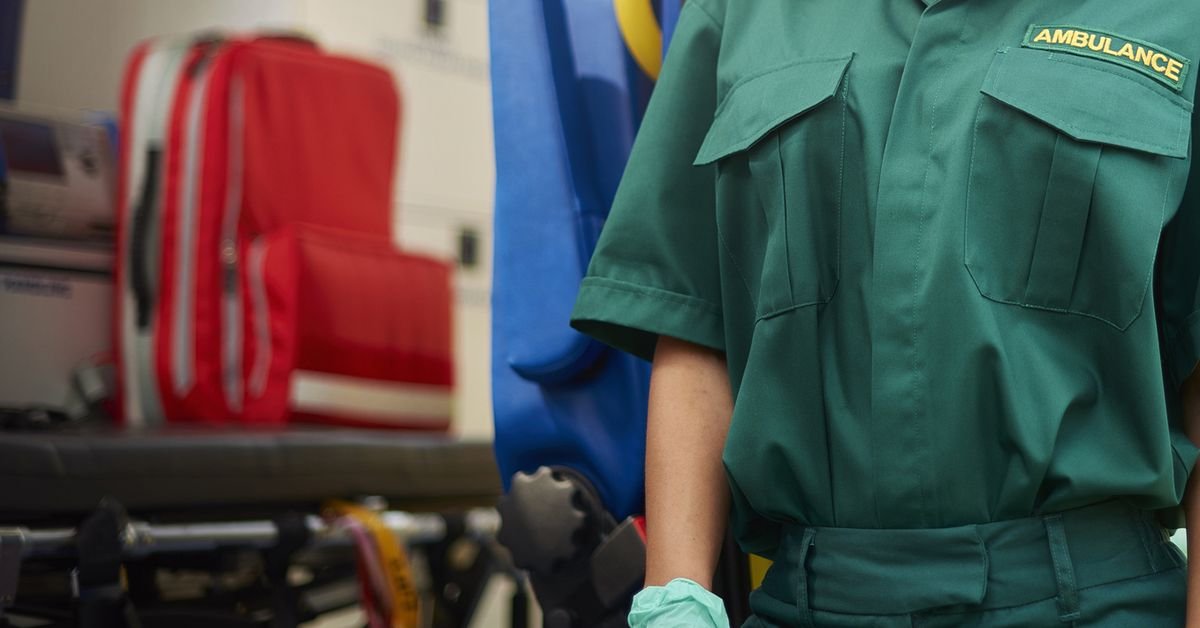Celebrity
Why paramedics always walk, and other insights from Osher Gunsberg’s interview with Sally Gould
Both of my parents were doctors, so it was easy for me to quickly bond over a shared lack of squeamishness with Sally Gould, the brilliant author of Frog, The Secret Diary of a Paramedic.
Like any person who chooses the emergency services as a career, Sally is a special breed of human being, one who willingly wades into some incredibly dangerous situations to save the lives of strangers.
I learned so much from speaking with her, and I’m sure you will too when you check out the episode. However, here’s just a few of the life lessons I learned from Sally Gould.
Watch the video above.
READ MORE: Harry feared King ‘blocked’ new passports for his kids over titles, names

1. Know when to walk (and when not to run)
Picture this: you’re a paramedic, hurtling towards a situation where someone is critically ill, the ambulance pulls up, every second counts.
What’s your first instinct? To run, right? Wrong.
Sally explained something fascinating: paramedics always *walk*. They don’t run. Why? Because arriving out of breath, heart pounding, and adrenaline surging isn’t helpful.
You need fine motor skills to administer medications, insert IVs, and make critical decisions. As Sally put it, “Arriving with a poised pace conveys the calm that we are arriving with.”
It’s also important to know that they are carrying a lot of very expensive equipment, so they can’t run without the risk of dropping and breaking these things.
This isn’t just about paramedicine. It’s a metaphor for life. How often do we rush through things, only to make mistakes or miss crucial details?
Sometimes, slowing down, taking a breath, and approaching a situation with a steady, calm pace is far more effective.
Whether it’s a challenging project at work or a difficult conversation, the “walk, don’t run” approach can make all the difference. It’s about deliberate action, not frantic reaction.
And most importantly, staying calm ensures that you’re fully in control, there to help the patient.
2. Calm is contagious
There’s a piece of wisdom I love that dates back to the Vietnam War, attributed to a Master Chief instructor in the Marines who had a sign on the wall reading, “Calm is Contagious”.
What I learned from Sally is exactly how that can work when a paramedic enters a chaotic scene, their demeanor can set the tone.
READ MORE: ‘Horrific’: Key detail Brooke Shields forgot for mum’s cremation

If they’re panicked and rushed, that energy spreads. But if they’re composed and confident, it can have a calming effect on everyone around them. It can go a long way when you are trying to help someone.
Sally described how even the pace and tone of her voice can influence a situation. Speaking slowly and deliberately, with pauses, can reassure people and help them feel more at ease.
She even has a personal technique: on the way to a patient, she hums a slow-tempo song to keep herself grounded and prevent her from rushing.
I’m not an ambo, however I think this is a really helpful tool for all of us. In high-pressure moments, maintaining your own inner peace and projecting it outward can be incredibly impactful.
It’s a reminder that our emotional state can affect those around us, and we have the power to be a source of calm in someone else’s storm.
3. Don’t let your bucket get too full
Sally taught me a lot about maintaining her emotional capacity for the job and how paramedics like her manage the immense stress and trauma they face daily.
The idea is that we all have an emotional bucket that fills up over time. Every intense moment or traumatic death she witnesses goes into that bucket.
READ MORE: Bindi Irwin ‘a whole new person’ after health scare, brother Robert says

In Sally’s words, “Once a bit of trauma goes into that bucket, you can’t really just empty it out. It’s not that simple. And every drop that goes in accumulates over time until that bucket’s overflowing and too heavy to carry and… it’s too late then.”
So how do we keep our bucket empty? Sally talked about the importance of coping mechanisms, like dark humour (we’ll get to that later), the ability to compartmentalise, and making a habit of finding ways to empty that bucket regularly, so it doesn’t overflow.
We all have emotional limits, and we need to be mindful of our own well- being. Knowing when to take a break, when to seek support, and when to prioritise self-care is crucial. It’s about being self aware of the way you are feeling, and not letting everything get to you at once.
4. Try to find the humour in it
I watched my own parents use humour to lighten the emotional burden that can weigh down a medical professional (which has left me with a sense of humour possibly darker than most).
Sally explained how paramedics often use gallows humour as a way to cope with the intense realities of their job. It’s not about being insensitive; it’s about survival.
As she said, “If we were as emotional and owning the grief of every job, as much as the patient and the relatives, we would not survive a day in the job [of a paramedic].”
This kind of humour allows them to create a bit of emotional distance, which is essential for maintaining their mental health and functioning effectively.
Plus, as Sally pointed out, sometimes a bit of levity can be a welcome distraction for patients and their families, even in the midst of a crisis. It is a way to reassure them, too. And it helps them know everything is going to be OK.
5. The magic of life isn’t just about birth
I have read enough stories about babies being delivered by paramedics that when I asked Sally about the magic parts of the job, I was sure she would regale me with a heartfelt story of bringing a baby into the world on someone’s front lawn.
Instead, for Sally, the most magical moments were the ones where she could give someone a dignified and peaceful passing.
It’s not something we like to think about, but death is a part of life. And when you’re an intensive care paramedic, you see death up close and personally all the time.
But instead of getting bogged down in sadness, Sally chooses to focus on the privilege of being there for people in their final moments.
When we spoke, I heard a reverent sparkle in her voice describing how special it is to help a family say goodbye on their own terms, in the comfort of their home. No clinical coldness, just love, respect and dignity.
My conversation with Sally Gould was eye-opening, moving and inspirational. She’s a very special person, who’s given us the immense gift of the lessons she’s learned from facing some of the most harrowing things a person could see.
We might not be rushing to save a life, however all of us could probably benefit from walking into an urgent situation to make sure we are thinking straight, humming a slow-jam to keep our breathing slow, and remembering that if we’re calm, we’re helping others be calm.
And when the crisis is over – that it’s important to find the humour in the chaos to keep our bucket empty.
FOLLOW US ON WHATSAPP HERE: Stay across all the latest in celebrity, lifestyle and opinion via our WhatsApp channel. No comments, no algorithm and nobody can see your private details.
















